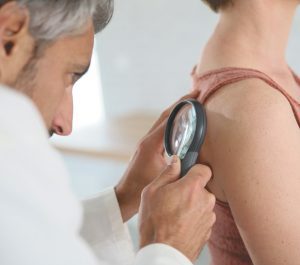By Dr. Graciela Garton
 According to the American Cancer Society, 1 in 5 Americans will develop skin cancer by the age of 70. With more than 5 million cases diagnosed annually, skin cancer is the most common type of cancer in the U.S.
According to the American Cancer Society, 1 in 5 Americans will develop skin cancer by the age of 70. With more than 5 million cases diagnosed annually, skin cancer is the most common type of cancer in the U.S.
Even more sobering is the widespread misconception that breast, prostate, lung, brain and bone cancers are the deadliest cancer diagnoses. Instead, that distinction belongs to melanoma, an aggressive form of skin cancer that accounts for most skin cancer deaths. In 2022, the American Cancer Society estimates 197,700 new cases of melanoma will be diagnosed across the country.
May is designated as National Skin Cancer and Melanoma Awareness Month. As the summer sun heats up, this serves as a timely opportunity to educate men and women of all ages about the dangers of skin cancer.
Risk Factors
About 90% of skin cancers, including 85% of melanoma cases, are primarily caused by exposure to ultraviolet (UV) radiation from the sun. Studies also show men are at a greater risk of developing and dying from melanoma than women. Researchers believe that is because a higher percentage of men work outdoors than women. Additionally, women’s skin care products, such as moisturizers, often contain SPF and provide low-level daily protection.
Skin cancer is also prevalent among individuals with fair complexions. Other risk factors include:
• Longterm, unprotected exposure to natural sunlight
• Exposure to artificial sunlight, such as tanning beds
• Unusual or rapidly growing moles
• Dry, pre-cancerous patches of skin
• Family health history
• Previous diagnosis of skin cancer
• Weakened immune system or related conditions
Types of Skin Cancer
No two skin cancers look alike, but all share a common symptom: a new or changing freckle, growth, lesion, bump, mole or rough, dry patch of skin.
Although there are multiple types of skin cancer, most are curable when caught early.
• Basal cell carcinoma: This type of cancer starts in the basal cells, which is where the skin produces new cells while older skin cells die. It presents as a transparent bump in areas that are exposed to the sun, such as the arms, legs, neck and head.
• Squamous cell carcinoma: Developing on areas of the body where sun exposure occurs, this type of skin cancer can appear as firm, red nodules or flat lesions with a crust-like surface.
• Melanoma: This forms within skin cells that manufacture a pigment called melatonin, forming large, brownish spots like freckles.
This can occur anywhere on the human body in the form of moles or lesions that change in size, shape, color and texture. Melanoma can also form in the mucous membranes surrounding the lips, nose and eyes.
Screening
Proactive screening can detect skin cancer and precancerous patches that may one day develop into a diagnosis. Use the ABCDE Rule to check for moles. Contact your doctor right away if you notice any of these signs:
• Asymmetric – The mole is not symmetrical.
• Border – The edges of the mole are jagged, rough or blurry.
• Color – Changes occur to the mole, such as spreading or multiple colors, darkening or loss of color.
• Diameter – The mole grows to more than one-fourth of an inch in diameter.
• Evolving – The mole changes in shape, size or color.
Other signs of cancer include a scaly or crusted growth on the skin, or a sore that just won’t heal.
Treatment at Advocate Radiation Oncology
Advocate Radiation Oncology’s board-certified radiation oncologists specialize in the treatment of all types of skin cancers, in addition to breast, prostate, lung, liver and bone, brain, rectal, and head and neck cancer. Treatment varies greatly and depends on each patient’s individual needs. Options include freezing, medicated creams, laser therapy, radiation, chemotherapy, biotherapies and more.
If you are concerned about skin cancer, contact Advocate Radiation Oncology. Our experienced team is happy to work with you to develop a comprehensive plan to defeat cancer.
About the Author
Dr. Graciela Garton is a board-certified radiation oncologist at Advocate Radiation Oncology.
For more information, please visit AdvocateRO.com.
Cape Coral Office
909 Del Prado Blvd. S
Cape Coral, FL 33990
(239) 217-8070
Bonita Springs Office
25243 Elementary Way
Bonita Springs, FL 34135
(239) 317-2772
Fort Myers Office
15681 New Hampshire Ct.
Fort Myers, FL 33908
(239) 437-1977
Port Charlotte Office
3080 Harbor Blvd.
Port Charlotte, FL 33952
(941) 883-2199
Port Charlotte Office
3080 Harbor Blvd.
Port Charlotte, FL 33952
(941) 883-2199
Naples Office
1775 Davis Blvd.
Naples, FL 34102
(239) 372-2838









